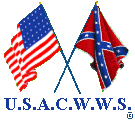
|
U. S. CIVIL WAR
PHOTOGRAPHS
|

|
VICKSBURG
(PAGE 3 OF 10)
| |
THE SIEGE OF VICKSBURG
MAY 26, 1863 - JULY 3, 1863.
Siege of Vicksburg.
Gen. U.S. Grant, assisted by the Navy under Admiral Porter.
Kurz & Allison, Art Publishers, [1888]. Lithograph, hand colored.
As a result of the second attack, May 22, Gen. Grant decided that Vicksburg
could not be taken by frontal assault and decided to lay siege to the city. Methodically, his
army to the city. Methodically, his
army constructed
a line of works around Vicksburg cutting it off from supplies and contact with
the outside world. On May 26, they began building thirteen approaches aimed at
different points along the Confederate line. The objective was to dig a tunnel
under the Confederate line and then destroy it with charges of black
powder constructed
a line of works around Vicksburg cutting it off from supplies and contact with
the outside world. On May 26, they began building thirteen approaches aimed at
different points along the Confederate line. The objective was to dig a tunnel
under the Confederate line and then destroy it with charges of black
powder , allowing
the Union forces to breach , allowing
the Union forces to breach the defenses. the defenses.
Around the end of June, Grant's forces, protected by artillery and
sharpshooters, neared their objectives. Along the Jackson Road, a mine was detonated beneath the Third
Louisiana Redan on June 25. Union forces charged into the crater attempting to
break through the breach. After approximately 26 hours of grim hand-to-hand
combat, the Federals were finally driven back and the breach sealed. was detonated beneath the Third
Louisiana Redan on June 25. Union forces charged into the crater attempting to
break through the breach. After approximately 26 hours of grim hand-to-hand
combat, the Federals were finally driven back and the breach sealed.
|
|

|

|
|
3rd Louisiana Redan - 2001
|
3rd Louisiana Redan - 2001
|

|

|
|
Shirley House - 1863 121
|
Shirley House - 2001
|
This house is the only surviving wartime structure in the Vicksburg
National Military Park. On May 26, 1863, Union forces started digging
an approach to the 3rd Louisiana Redan from nearby. Several days later,
the Confederates opened fire on the workers with a cannon mounted in
the redan. The Yankees countered with artillery of the "White House
Battery" named after
this house. named after
this house.
|
|
| |
On July 1, a second mine was detonated but not followed by an infantry assault.
Throughout June the gallant defenders of Vicksburg suffered; under the
bombardment of enemy guns; from reduced rations; and exposure to the elements.
Reduced in number by sickness and battle casualties, the garrison of Vicksburg was spread dangerously thin.
Soldiers and citizens alike began to despair that relief would ever come. At
Jackson, C.S.A. General Johnston gathered a relief force which set out for
Vicksburg on July 1. But by then it was too late to stop the fall of the city. of Vicksburg was spread dangerously thin.
Soldiers and citizens alike began to despair that relief would ever come. At
Jackson, C.S.A. General Johnston gathered a relief force which set out for
Vicksburg on July 1. But by then it was too late to stop the fall of the city.
With the loss of Pemberton's army and the vital Mississippi stronghold at
Vicksburg, the Confederacy was effectively split in half. Grant's success
boosted his reputation, and lead ultimately to his appointment as
General-in-Chief of the Union armies.
| |
PAGE FOUR
 >
Civil War Photos
>
Western Map
>
Vicksburg
>
Page 2
>
3
>
4
>
5
>
6
>
7
>
8
>
9
>
10
>
Civil War Photos
>
Western Map
>
Vicksburg
>
Page 2
>
3
>
4
>
5
>
6
>
7
>
8
>
9
>
10
Notes
|
|



